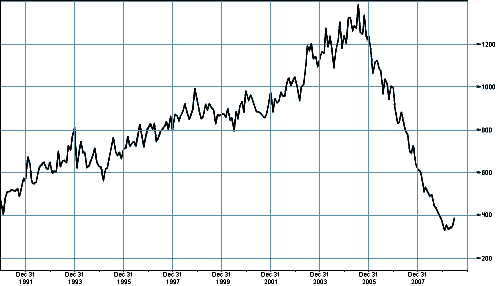The U.S. housing market may finally have turned around after three years, given the rise in the widely-watched Case-Shiller home price index for May, the developers of the index told Reuters on Tuesday. The Case-Shiller home price index for May posted an increase of 0.5 percent, the first monthly rise since 2006, in instead of a forecast 0.5 percent decline, though prices have tumbled more than 32 percent from their peak in the second quarter of 2006.
"This is much more important than an up day on the stock market. It may mean that we may have changed direction," Yale University economist, Robert Shiller, and one of the developers of the index told Reuters Television. After seasonal adjustment, prices showed a 0.2 percent decline, but this was still an improvement in the recent trend, economists said. It is "a pretty significant indicator that we might be at or near a bottom," the other developer of the index, economist Karl Case, said in an interview. Other recent signs of a housing market turnaround were seen in new home sales data for June which jumped 11 percent, the biggest monthly gain in eight years, the U.S. Commerce Department said on Monday. Existing home sales rose for the third straight month in June, the National Association of Realtors said last week, feeding optimism about the beleaguered housing sector…
"I am worried that we’ll have five or more years of a weak economy because we’re seeing economic situations of fundamental uncertainty," Shiller said. The lesson of the housing bubble is that preventative risk-management must be a priority going forward, Shiller said. For example, changes to mortgage contract structure must be made to protect home-buyers in the event of a downturn. "The new standard for mortgages should be a continuous work-out mortgage," he said, which means that "if home prices fall then your mortgage payments will go down," Shiller said.
But the U.S. government bailouts of banks hit by losses on home mortgages in the past year may mean there will be less incentive for banks to engage in such risk management techniques, Shiller admitted. "The bailouts we’ve seen were extraordinary events that we want to prevent as much as possible in the future," he said. "We should be trying to encourage private risk management on a better scale."
The U.S. economic recession since December 2007 has prompted a much-needed "revolution in theoretical finance," with a renewed focus on a factor that economists once disdained: the psychology of the market. "The reason that so few economists saw this crisis coming is that they completely blocked out from their view anything about human behavior," Shiller said. Confidence in the U.S. financial system, which Shiller said is crucial for an economic recovery, can be best restored by having a clear regulatory framework for investors. "We have to do confidence-inspiring things, which means making sure that we stay a capitalist economy with clearer rules," he said…


Sorry, the comment form is closed at this time.